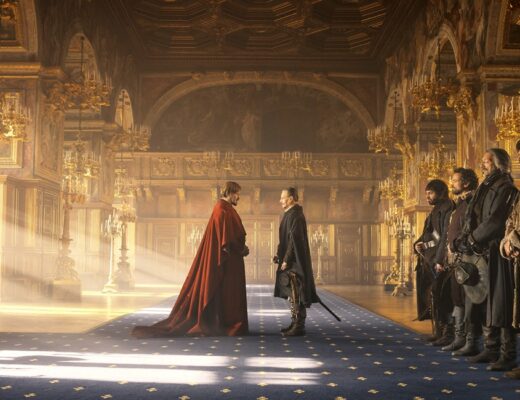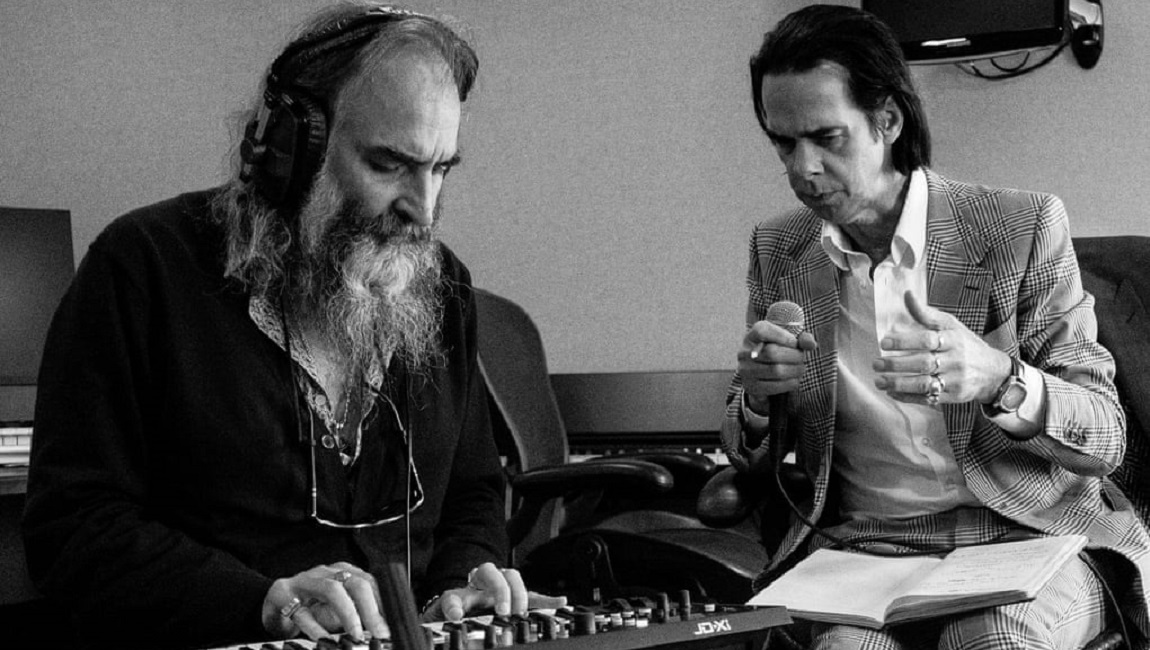A major fear factor in horror stems from isolation, and its pervasive influence extends to both claustrophobic and agoraphobic conditions. Whether confined within a box — with no way out when evil seeps in — or swept up in unknown expanses, the absence of some physical or symbolic recourse to normalcy puts viewer and victim alike at the mercy of perpetual dread. More so in the case of the murder mystery: the mere facticity of a killing done and dusted arouses feelings of sadness and disgust, but where there is room for further violence, the horror of not knowing who did it is quickly sharpened. Fitting, then, for a whodunnit to take place at the literal edge of the earth, in geographically isolated Iceland under snowstorm conditions, its participants hunkered down in some state-of-the-art, nuclear-grade bunker. In Brit Marling and Zal Batmanglij’s miniseries, A Murder at the End of the World, isolation is the order of the day, as manifested in several strands: physical, as when guests at the lavish hotel of tech billionaire Andy Ronson (Clive Owen) are effectively held under lockdown; social, as in the equally transactional, equally suspicious relationships of those at the table; and mental, as evidenced in the creeping disorientation that threatens to unravel both the past and present for Darby Hart (Emma Corrin), a true-crime novelist and the show’s protagonist.
Darby was (and is) an amateur sleuth whose claim to fame came with The Silver Doe, a book-length chronicling of her path to cracking the identity of a serial killer alongside fellow crimebuster and — for a while — romantic partner Bill Farrah (Harris Dickinson). Invited to a mysterious retreat by Andy, via special holographic envoy Ray (Edoardo Ballerini), she accepts out of genuine intrigue and deep admiration for Andy’s wife, Lee Andersen (Brit Marling), not knowing that the couple have also reserved a place for Bill, with whom she had fallen out six years prior. The rest of the company is the sort of roundtable personalities you’d find on LinkedIn, minus a chauvinist or two: filmmaker and A.I. shill Martin Mitchell (Jermaine Fowler), an infinitely cringeworthier version of Robert Zemeckis; smart-city magnate Lu Mei (Joan Chen, refreshingly cast and more composed from her role some thirty years earlier in Twin Peaks); and astronaut and moonwalker Sian Cruz (Alice Braga), signaling the show’s slight pivot into alternate reality. There’s also Ziba (Pegah Ferydoni), a socialist activist of sorts; David (Raúl Esparza), an unabashed venture-capitalist; Oliver (Ryan J. Haddad), a Musk-like tech guru and robotics whiz; and Rohan (Javed Khan), a doomsday climatologist who went off the grid before suddenly emerging at the party.
The setup envisioned by Andy for this get-together is no less ostentatious, intended to facilitate the meeting of various great minds and bring about the flurry of ideas that have provided so much jack-off fodder for today’s tech bros and self-styled self-help experts. With less pizazz than Edward Norton’s lavish billionaire’s vacation in Glass Onion: A Knives Out Story, but still following in that film’s footsteps, Marling and Batmanglij’s seven-episode narrative ramps up the tension by the end of the first, when Darby — after barely exchanging words with Bill — finds him in his room, face bloody and struggling to breathe. It barely warrants a spoiler alert to say that Bill doesn’t make it — but Darby’s memories of him do, and much of the successive plot intertwines the stakes at hand with flashbacks to the duo journeying across small-town America in search of criminal justice. We witness Darby as a fledgling, impressionable teen who accompanies her coroner father to crime scenes and morgues; wend our way through 2010s-era Reddit forums of investigative zeal and anonymity; and watch as she stubbornly and — against all odds — tracks down the killer and emerges miraculously unscathed. Simultaneously in the present, the whodunnit formula works reliably to engender paranoia and elucidate the requisite backstories of Darby’s fellow guests, in particular Sian (who knows more about their host than anyone else) and Rohan (whose hitherto unknown connection to Bill sends Darby on multiple occasions into the forbidding snow around their fortress).
So far, so good. But where A Murder at the End of the World seeks its absolution from isolation is also where it finds it least: couched in the rhetorical and ideological imaginaries of Gen Z cyberspace. Much of the series proves formulaic and tedious, notwithstanding the baseline tensions that mark any crime without a culprit, because the backstory intended to flesh out Darby’s motivation and personality has little skin in the overall game. She’s a self-taught hacker, which allows her to fiddle with Andy’s gizmos at hand with relative ease; she’s persistent, which allows her to stay on as the show’s protagonist and unintentionally prove her worth at a table with a per capita net worth and cultural capital far exceeding hers; and she seemingly has plot armor (or diplomatic immunity, if you will) in spite of the several death threats that come her way, given just how trusting she is of everyone to divulge what she’s thinking in front of them. Accosting one of them for wearing a certain apparel, confronting another seconds after the latter’s indiscretion: the amateurish aspect of her sleuthing, having met with little friction, is thus rendered cheap and less credible.
The series’ ham-fistedness likewise speaks to the writers’ unmoored and uninspired thematic preoccupations. Though these preoccupations resemble those of famous provocateur Ruben Östlund, the comparison does little to foster confidence, seeing as Östlund’s modus operandi has always been to drive home the point that rich people are idiots and technology an intellectual retardant in the most inane and faux-modest ways possible. Marling and Batmanglij’s ostensible thesis — that technology can kill — is belied by its implicitly fetishistic regard for it. Little more than surface commentary about Andy’s snug coterie of industry friends and enemies colors their introduction beyond stock types, while tech and social buzzwords are mostly advanced to showcase his latest contraption or set while the murder mystery chassis remains its leaden centerpiece, with increasingly diminishing returns. Andy’s young son (Kellan Tetlow) offers a cautionary tale of egomaniacs spreading death and destruction for legacy’s sake, set to the tonal and aesthetic beats of an Economist podcast. (He’s even called Zoomer, which, you know, is the generation after the Millennials — they love TikTok and can’t live without their eyes glued to three different screens at once!) Imbued the narrative with way more true-crime gravitas than anything snarky, however, results in an insipid and unholy synthesis of talking-point television and platitudinous soundbites, which helps if you’re a die-hard liberal, or a tech enthusiast looking for a career shift toward investigating (or perpetuating) crime. It’s not as grating, but it’s also boring.
What’s most damning about A Murder at the End of the World, though, is that it subordinates the compelling and thrilling stuff that propels murder mysteries under its broader characterization of Gen Z-as-moral-crusaders against the wicked few. Lest this review be seen as an apology for billionaires and their cushy dystopian hideouts, it should be noted that these few are wicked indeed, but this comes across rather half-heartedly throughout the show. Jabs are taken against some of them every now and then, but almost politely (some dialogue bits could be lifted from press releases at Davos), and the juxtaposition of Darby’s sense of curiosity and righteousness against the contemporary inaction of those her senior doesn’t quite gel, primarily because neither is fleshed out sufficiently to inspire more than vague emotions of vindication and irritation respectively. (We have a handle on the Silver Doe case way before things are set in motion, and with the Icelandic troupe we’re generally lukewarm to their fate, beyond one admittedly thrilling sequence involving a rapidly decreasing air supply and invoking the perils of relinquishing manual override.) With Andy as case in point, the series takes great pains to orchestrate the symbolic downfall of powerful men, and takes similarly great pleasure in preaching its wafer-thin screeds of online, consumer feminism; the denouement amounts to essentially an excoriation of typical toxic masculinity, coupled with a warning not to actually heed the advice of Neuralink enthusiasts and overzealous blue-checks. If that, indeed, is the whole point of the show, it wouldn’t require any on-screen killing at all; just boot up social media, and watch yourself die a little inside.
CREATOR: Brit Marling & Zal Batmanglij; CAST: Emma Corrin, Clive Owen, Harris Dickinson, Brit Marling, Joan Chen; DISTRIBUTOR: FX/Hulu; STREAMING: November 14







